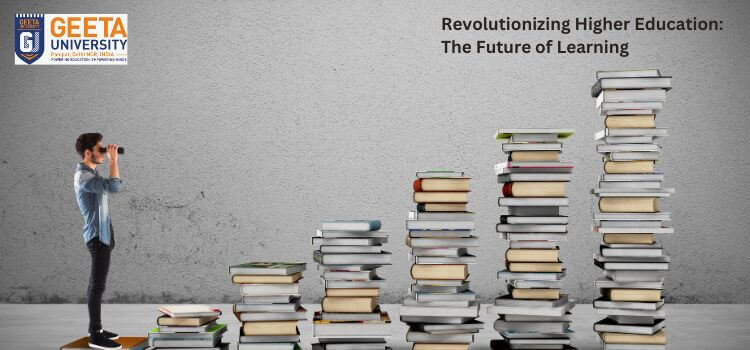
Revolutionizing Higher Education: The Future of Learning – Geeta University
Higher education is experiencing a profound transformation, driven by advancements in technology and changing student needs. The future of learning is marked by innovation, collaboration, and personalized experiences. In this blog, we will explore the ways in which higher education is being revolutionized, and how these changes are shaping the future of learning for students.
Blended Learning: The Best of Both Worlds :
Blended learning combines traditional face-to-face instruction with online and digital resources, offering students the best of both worlds. This approach allows for flexibility, personalized learning paths, and access to a wide range of educational materials. Students can engage in interactive online modules, participate in virtual discussions, and attend in-person lectures or workshops. Blended learning enables students to tailor their learning experiences, promotes self-directed learning, and prepares them for the digital landscape of the modern workplace.
Adaptive Learning: Tailoring Education to Individual Needs :
Adaptive learning leverages technology and data analytics to deliver personalized education that adapts to the unique needs of each student. Through intelligent algorithms, adaptive learning platforms assess students’ strengths, weaknesses, and learning styles to provide targeted content and activities. This individualized approach fosters engagement, promotes mastery of subjects, and ensures that students progress at their own pace. Adaptive learning empowers students to take ownership of their education, provides immediate feedback, and identifies areas for improvement, resulting in enhanced learning outcomes.
Virtual and Augmented Reality: Immersive Experiences :
Virtual and augmented reality technologies are transforming the way students learn by creating immersive and interactive experiences. Virtual reality transports students to simulated environments, enabling them to explore historical sites, conduct scientific experiments, or engage in simulated professional scenarios. Augmented reality overlays digital information onto the real world, enhancing learning through interactive elements. These technologies promote active learning, critical thinking, and problem-solving skills. By bridging the gap between theory and practice, virtual and augmented reality enhance student engagement and understanding.
Collaborative Learning: Building Connections and Skills :
Collaborative learning emphasizes the importance of teamwork, communication, and collective problem-solving. In the future of higher education, collaboration is facilitated through online platforms, virtual workspaces, and project-based assignments. Students collaborate with peers from diverse backgrounds, fostering cultural exchange and the development of global competencies. Collaborative learning promotes the sharing of ideas, encourages constructive feedback, and enhances communication skills. Through teamwork, students develop essential skills valued in the professional world, such as leadership, negotiation, and conflict resolution.
Lifelong Learning: Embracing Continuous Education :
The future of learning in higher education embraces the concept of lifelong learning. As knowledge rapidly evolves, the traditional model of education is being replaced by a culture of continuous learning. Universities are offering micro-credentials, online courses, and professional development programs to cater to the needs of learners throughout their careers. Lifelong learning encourages self-improvement, adaptability, and the acquisition of new skills. It enables individuals to stay relevant in a rapidly changing job market and empowers them to pursue personal and professional growth beyond graduation.
Conclusion :
Revolutionizing higher education and embracing the future of learning holds tremendous promise for students. Blended learning, adaptive learning, virtual and augmented reality, collaborative learning, and lifelong learning are transforming the educational landscape. By embracing these innovative approaches, universities can provide students with dynamic, personalized, and engaging learning experiences that prepare them for the challenges and opportunities of the future. As we revolutionize higher education, we empower students to become lifelong learners, critical thinkers, and adaptable professionals in an ever-evolving world.
If you like it, then keep reading the top university in Delhi, NCR viz. Geeta University’s blogs!!!
- By Garvita Aggarwal
Related Posts

Education trends after Covid 19 – Geeta University
The COVID 19 pandemic flipped the world’s education system upside down this year, causing a significant shift in how pupils learn and teachers teach. Education

Discovering the Marvels of Image and Video Processing While Exploring the Future of Visualization
Discovering the Marvels of Image and Video Processing While Exploring the Future of Visualization In the beginning… Image and video processing have developed into technologies
Data Driven Marketing Decisions
Introduction: In today’s digital age, data has emerged as a cornerstone of effective marketing strategies. The ability to collect, analyze, and leverage data enables marketers


